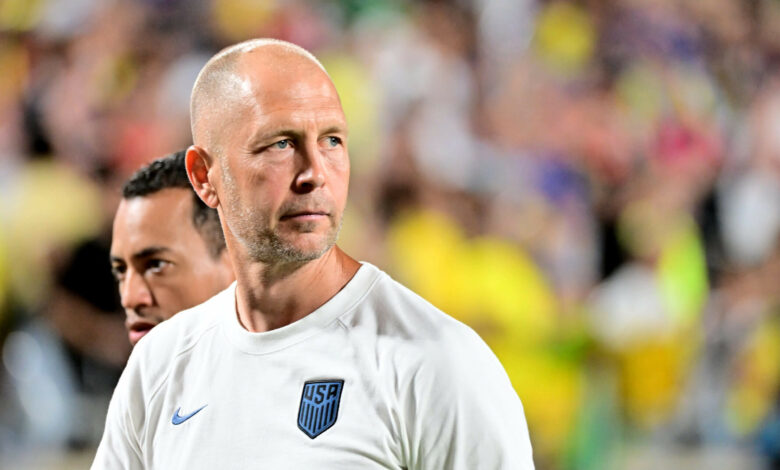Gregg Berhalter rebuilt the USMNT. Will he be the one to lead them in 2026?

When Gregg Berhalter became coach of the U.S. men’s national team five and a half years ago, the program was still struggling to emerge from the darkest period in its history.
The 2017 loss to Trinidad and Tobago, which knocked the U.S. out of qualifying for the following year’s World Cup in Russia, was more than a wake-up call. It forced U.S. Soccer’s leadership to examine every blemish in the mirror. It highlighted the failures of previous cycles to develop young talent. A year after that game, Berhalter was hired to lead the national team forward.
Now, after a failed group stage at the Copa America on home soil, the US program is once again confronted with its failures.
This time around, the evaluation revolves around whether Berhalter is the right person to lead the program toward the 2026 World Cup, which the United States is co-hosting with neighbors Canada and Mexico.
If it were up to Berhalter, the answer would be a simple, “Yes.” The coach had only one word to say when asked after Monday’s loss to Uruguay that sent his team out of the Copa America in the group stage whether he believed he was still the right person for the job. He also acknowledged that the decision would not be up to him. U.S. Soccer officials will evaluate Berhalter in the coming days.

GO DEEPER
Inside the VAR review of Uruguay’s winning goal against the USMNT
“Our tournament performance fell short of our expectations. We must do better,” U.S. Soccer sporting director Matt Crocker wrote in a statement released by the federation 90 minutes after the match against Uruguay ended. “We will conduct a comprehensive evaluation of our performance in the Copa America and how we can best improve the team and results as we look ahead to the 2026 World Cup.”

The US lost to Panama and Uruguay in the group stage of the Copa America. (Photo by Hector Vivas/Getty Images)
When Berhalter was hired, his task was not a simple one, nor was it a linear progression.
His first U.S. teams were a mix of old and new, as he tried to strike a balance between experience and pure, raw youth. His first tournament call-ups in the summer of 2019 included Weston McKennie, Tyler Adams and Christian Pulisic, none of whom had played in a Gold Cup, as well as Jozy Altidore and Michael Bradley, both of whom had more than 100 caps. Berhalter then called up a competitive squad for the 2021 Nations League. The team’s progress under his leadership was evident.
The squad consisted mainly of young players, with players such as Sergino Dest (then with seven caps), Antonee Robinson (10), Adams (12), McKennie (21), Yunus Musah, Brenden Aaronson (both four), Pulisic (15), Gio Reyna (also four), Josh Sargent (13) and Tim Weah (10).
The U.S. won that tournament, their first victory over Mexico. It was the first of three consecutive Nations League titles, and Berhalter continued to add new, young faces to the program.
He successfully navigated qualification for the 2022 World Cup with one of the youngest teams in international soccer. And while it was an imperfect path to returning to the World Cup—the U.S. finished third in CONCACAF qualifying—reaching the tournament in Qatar allowed the program to close the door on that 2018 failure. Berhalter’s young team went on to impress at the World Cup, performing well in the group stage before being eliminated in the first knockout round by the Netherlands.

Berhalter helped the U.S. return to the World Cup in 2022 after the team failed to qualify in 2018 (Photo by Tim Nwachukwu/Getty Images)
The idea behind the whole process was to work towards the home World Championship in 2026.
Berhalter did well in the first cycle with this team, but the past year has felt much more tentative. U.S. Soccer leaders must now determine whether the coach who guided the transition from 2018 to 2022 is the right person to build toward that 2026 tournament.

GO DEEPER
How Uruguay’s masterful man-to-man marking kept the USMNT out of the Copa America
Crocker already said yes to that question once, when he and the U.S. Soccer leadership team, including President Cindy Parlow Cone and CEO and General Secretary JT Batson, brought Berhalter back last summer. But the USMNT’s inability to pull out of the Copa America group has led to a new referendum on the program.
Taken in isolation, it would be harsh to lay all the blame for this failure on Berhalter and the coaching staff. Weah’s first-half red card undoubtedly had an impact on Panama’s result, changing their path to the knockout rounds. But the results as a whole over the past year suggest more stagnation than progress. Berhalter’s teams still lack a signature win over a top opponent. In the past 12 months, we have suffered defeats to Germany and Colombia, the latter by an embarrassing 5-1 scoreline. A draw with Brazil was positive, but was followed within weeks by this Copa America elimination.
Not leaving the fold was a missed opportunity on several levels, from the team’s growth to its potential impact on the growth of the sport in the U.S. during a soccer summer that can attract new fans and help prepare for 2026.
Berhalter is a process-oriented coach, who is precisely attuned to the details of his program. His grueling work ethic is familiar to anyone who has worked with the team for the past five and a half years. For Berhalter, what happened in the Copa America was a setback.
“We know we can do more, and in this tournament we didn’t show that,” Berhalter said. “It’s really that simple.” But as he has done throughout his tenure, Berhalter also framed it as a moment to learn lessons and build on.
“When you’re in tournament football, there’s not much that separates success from failure,” Berhalter said. “It’s one play, it’s one decision by the referee, and you can get in trouble. For us, it’s a matter of realizing that every time we step on the field, it has an impact. And I think we’re getting there, but we’re not always there. And that’s something we can improve on.”

Players credit Berhlater for creating the group’s close bond. (Photo by Michael Reaves/Getty Images)
After Monday’s loss at Arrowhead Stadium in Kansas City, players in the mixed zone supported Berhalter with some of the same ideas they discussed during the most recent hiring process. The team’s culture, which they attributed largely to Berhalter, remained a strength in the group. There was trust in each other, they said.
“I think we all feel good about Gregg, and we all understand him and we’ve had him for a long time,” McKennie said in the mixed zone. “He’s taken the team a long way since we started. I think the connection we have with him is important, in having a coach that players would run through a brick wall for, players that listen to him. And so I think whatever happens, happens, but I think if he’s the coach, we’re all happy.”
Only now must the U.S. Soccer Federation consider whether that comfort is a strength or a weakness.
Is that comfort level within the group under Berhalter a barrier to perseverance? Are the red cards — specifically those of Weah and defender Dest in a Nations League match in Trinidad last November — signs of too much play? Is a group full of young players, too used to discussions around their team as a ‘golden generation’, becoming complacent?
The results in the Copa, one win and two losses, and the past year, should at least challenge the way this team is talked about.
Yes, the squad is filled with players from all over Europe, including a handful who play for some of the biggest clubs in the world. And yes, it was still the second-youngest team in both the Copa America and the European Championship, which took place in parallel in Germany this summer. But their roles for those clubs are different.
Few are expected to carry their team, and compared to the best international teams in the world, Pulisic aside, the U.S. still lacks real stars, the difference makers who can turn games on their heads at the highest level. That has manifested itself in a team that has struggled to score enough goals, both in Qatar and this summer.
This American team has talent, but in the grand scheme of world soccer, it remains an upstart that challenges the best. The team can’t afford to believe it’s there. It’s a notion veteran center back Tim Ream seemed to hint at in the mixed zone after the Uruguay game.
“This is a great group, as everyone knows, and a very close-knit group, but sometimes the intensity slips through,” Ream told Univision. “We’ve got to keep our heads up and keep working, stay humble enough to know that there are things we can continue to improve on, every day, every practice, every game.
“If guys have that mindset, they can continue to move upward. If we start thinking we’re a finished product, then guys will stagnate and just stay at the level they’re at.”
Part of that, of course, should be on the players. That was certainly a theme for the team after Monday’s loss. “I don’t think this tournament really had anything to do with the staff or the tactics or the way we play,” Reyna said. “I think it was more individual mistakes.”
But some of that also falls on the shoulders of Berhalter and his staff.
If US Soccer’s leaders believe this team needs to be challenged to get to the next level, then there are legitimate questions about whether the culture within the program is currently set up for that. And if so, whether Berhalter is the right person to do it.
“I don’t think so. I don’t think we’ve made enough progress since the World Cup,” USMNT legend Clint Dempsey said Monday night on Fox, when asked if Berhalter is still the right voice to lead the program. “We’re not on the right track. … For me, it wasn’t good enough.”
As for next steps, there are many factors beyond just on-field performance that U.S. Soccer will consider. The federation is likely aware of the discourse surrounding Berhalter and the national team, with a growing fan base focusing on the coach as the problem. “Berhalter out” is a rallying cry on social media, ubiquitous in any discussion or debate surrounding the team.
The biggest question, however, is who they would approach if they were to replace Berhalter.
There are no obvious candidates for the position.
One finalist from the last round of interviews, Jesse Marsch, only recently accepted the job with Canada. Notably, Canada advanced to the knockout stages of the Copa America, albeit with just one goal in three group games. Some of the big names that fans would like to see cost multiples of the salary that US Soccer currently pays Berhalter, and that doesn’t even begin to question whether they would want the job in the first place.
The decision that US Soccer makes in the coming days, and if it decides to leave Berhalter, the weeks that follow, will have a huge impact on what happens in two years when the World Cup returns to these shores. The disappointment of a similar result in that tournament would overshadow this current failure.
When you consider the stakes and expectations, the task facing the U.S. national team feels even greater than the monumental task of recovering from its failure in Trinidad nearly seven years ago.

GO DEEPER
USMNT’s Copa America exit raises big questions. But is Pulisic the one to answer them?
(Top photo: Julio Aguilar/Getty Images)




